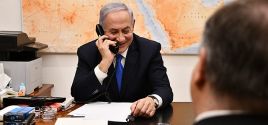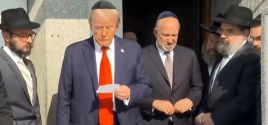Lords reject torture evidence useBBCDec. 08, 2005 |
Popular 
Israel Detains American Journalist for Reporting on Damage from Iran's Strikes [UPDATE]

Chris Rufo Discovers Who is Flooding The Small Town of Charleroi, Pennsylvania With Haitian Migrants

WATCH: New Film 'Atrocity Inc' Exposes How Israel Lied About October 7th to Justify Genocide

Netanyahu: Trump Called to 'Congratulate' Me On War With Hezbollah

Trump Visits Lubavitcher Rebbe's Grave With Ben Shapiro for October 7th
 Secret evidence which might have been obtained by torture cannot be used against terror suspects in UK courts, the law lords have ruled. The ruling means Home Secretary Charles Clarke will have to review all cases where evidence from other countries might have been obtained in this way. It is a victory for eight men who had been held without charge. Mr Clarke said he accepted the ruling and it would have "no bearing" on government efforts to combat terror. He said the government did not use evidence it knew or suspected had been obtained by torture but the ruling had clarified the appropriate legal test of what was admissable. Human rights Thursday's ruling centres on how far the government must go to show improper methods if obtaining information from suspects have not been used. An independent judiciary has once again been more effective in defending individual rights than this government Sir Menzies Campbell, Liberal Democrats The Court of Appeal ruled last year that such evidence could be used if UK authorities had no involvement. But eight of the 10 foreign terror suspects who were being held without charge, backed by human rights groups, challenged that ruling. They argued evidence obtained in US detention camps should be excluded from court hearings. It is thought some of the eight men are being held in Belmarsh prison, pending deportation, some released on bail and others restricted by the government's new control orders. The Home Office will not confirm precise figures. The Special Immigration Appeals Commission (SIAC) must now investigate whether evidence against the suspects facing deportation was obtained by torture. 'Hypothetical' The home secretary said the government had not been planning to rely on evidence it knew or suspected had been obtained under torture. He said he did not expect the ruling to affect the outcome of the men's appeals. Mr Clarke said: "We have always made clear that we do not intend to rely on or present evidence in SIAC, which we know or believe to have been obtained by torture. So this issue is hypothetical." Quoting one of the law lords' judgements, Mr Clarke said it was "one thing to condemn torture as we all do" but another to "find a solution to the question that this case raises which occupies the moral high ground but at the same time serves the public interest and is practicable". 'Abhorrence' The law lords' unanimous finding that the men's appeal should be allowed began with a forthright condemnation of torture by Lord Bingham, the former Lord Chief Justice, who headed the panel of seven law lords. He said the English law had regarded "torture and its fruits" with abhorrence for over 500 years. "I am startled, even a little dismayed, at the suggestion (and the acceptance by the Court of Appeal majority) that this deeply-rooted tradition and an international obligation solemnly and explicitly undertaken can be overridden by a statute and a procedural rule which make no mention of torture at all." Another member of the panel, Lord Carswell said: "The duty not to countenance the use of torture by admission of evidence in judicial proceedings must be regarded as paramount and to allow its admission would shock the conscience, abuse or degrade the proceedings and involve the state in moral defilement." 'Momentous' Conservative shadow attorney general Dominic Grieve said the judgement was "a completely correct restatement of a law that has existed for hundreds of years". Lib Dem foreign affairs spokesman Sir Menzies Campbell said it was a "landmark judgement", which would have implications for other cases coming before the courts. He said it showed "an independent judiciary has once again been more effective in defending individual rights than this government". Amnesty International said the "momentous" ruling overturned the "tacit belief that torture can be condoned under certain circumstances". Shami Chakrabarti, director of civil rights pressure group Liberty, said: "This is an important message about what distinguishes us from dictators and terrorists. "We will not legitimise evidence obtained by torture by using it in our justice system." |



